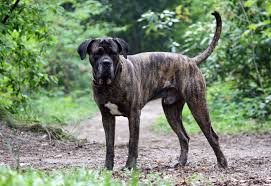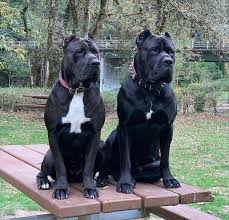The King Corso, also known as the Italian Mastiff or Cane Corso is a majestic and powerful dog breed that has a history dating back to ancient Rome. Originally bred for hunting, fighting, and guarding, the Cane Corso is now a beloved family pet that is known for its loyalty, intelligence, and protective nature.
The King Corso is a large dog breed, with males typically weighing between 100 to 120 pounds and standing 25 to 27 inches tall at the shoulder. Females are slightly smaller, weighing between 80 to 100 pounds and standing 23 to 25 inches tall. They have a muscular and athletic build, with a short, dense coat that comes in a range of colors, including black, fawn, blue, and brindle.
While the king Corso may look intimidating, they are known for their gentle and loyal personalities. They are highly intelligent and trainable, making them a great choice for experienced dog owners who are willing to put in the time and effort to properly socialize and train their pet. Due to their protective nature, it is important to socialize them with other dogs and people from a young age.
Training a king Corso requires patience and consistency. Positive reinforcement techniques, such as treats and praise, work best with this breed. They are highly intelligent and eager to please, so they respond well to training that is both rewarding and challenging.
Cane Corsos are an active breed that requires plenty of exercise to maintain their physical and mental health. They enjoy daily walks, runs, and playtime in a fenced-in yard. While they don’t require extensive grooming, they do shed moderately, so regular brushing is recommended to keep their coat healthy and shiny.
Howeve, the Cane Corso is a unique and impressive dog breed that requires a responsible and dedicated owner. With proper socialization, training, and care, they can make a loving and loyal companion for the right family. So, if you’re looking for a powerful and protective four-legged friend, consider the Cane Corso – the king of dogs.
Read Also: Considerations and Requirements for Rabbit Housing
History and Origin of King Corso Dogs

Over time, the Roman dogs were bred with other breeds, resulting in the development of the Cane Corso. The breed’s name comes from the Latin word “cohors,” which means “protector” or “guardian.” The Cane Corso was used for a variety of tasks, including hunting, guarding livestock, and protecting property.
In the mid-20th century, the Cane Corso was on the brink of extinction, but a group of Italian breeders worked to revive the breed. They selectively bred the remaining Cane Corsos to produce dogs that were true to the breed’s original type and temperament.
Today, the Cane Corso is recognized by the American Kennel Club and is a popular breed around the world. They are still used for guarding and protection, but they are also beloved family pets that are known for their loyalty and intelligence.
Health Issues and Lifespan of King Corso Dogs
Hip Dysplasia: This is a common condition in large breeds, including the Cane Corso. It occurs when the hip joint doesn’t form correctly, leading to arthritis and pain. Hip dysplasia can be diagnosed through X-rays, and treatment may include medication, weight management, and surgery.
Bloat: Bloat, also known as gastric torsion, is a life-threatening condition that can occur in dogs with deep chests, such as the Cane Corso. It happens when the stomach twists, trapping gas and food inside. This can cause a variety of symptoms, including vomiting, lethargy, and difficulty breathing. Bloat requires immediate veterinary attention and can be prevented by feeding multiple smaller meals throughout the day instead of one large meal.
Heart Disease: Cane Corsos can be prone to a variety of heart conditions, including dilated cardiomyopathy and subaortic stenosis. These conditions can cause a range of symptoms, including coughing, lethargy, and difficulty breathing. Treatment may include medication and lifestyle changes.
Other Health Issues: Cane Corsos may also be prone to other health issues, such as allergies, ear infections, and eye problems.
The average lifespan of a Cane Corso is 9 to 12 years. However, with proper care and veterinary attention, they may live longer. To ensure your Cane Corso lives a long and healthy life, it’s important to provide them with proper nutrition, exercise, and regular veterinary care. Additionally, working with a reputable breeder who screens their dogs for genetic health issues can help reduce the risk of certain conditions.
Read Also: Benefits of Rabbit Production
King Corso Dog Breed Complete Grooming and Care Guide

Brushing: Cane Corsos have a short, dense coat that sheds moderately. Brushing your Cane Corso once or twice a week with a slicker brush or a grooming glove can help remove loose fur and prevent matting. Brushing also helps distribute the skin’s natural oils, which can help keep their coat shiny and healthy.
Bathing: Cane Corsos generally don’t require frequent baths. You should only bathe your Cane Corso when they’re visibly dirty or have a strong odor. When you do bathe them, use a dog-specific shampoo and conditioner and rinse them thoroughly to prevent any residue from irritating their skin.
Nail trimming: Long nails can be uncomfortable and painful for your Cane Corso. Trim their nails once a month or as needed, being careful not to cut into the quick (the pink part of the nail that contains blood vessels and nerves).
Dental care: Dental care is important for your Cane Corso’s overall health. Brush their teeth regularly with a dog-specific toothpaste and toothbrush. You can also provide dental chews or toys to help keep their teeth clean.
Exercise: Cane Corsos are an active breed that require daily exercise to maintain their physical and mental health. A daily walk, run or playtime in a fenced-in yard can help meet their exercise needs.
Training: Cane Corsos are intelligent and trainable dogs that require consistent and positive reinforcement training. Proper training and socialization can help ensure they are well-behaved and obedient.
Nutrition: A high-quality, well-balanced diet is essential for your Cane Corso’s overall health. Consult with your veterinarian to determine the appropriate amount and type of food for your Cane Corso based on their age, weight, and activity level.
Regular check-ups: Regular veterinary check-ups are important for your Cane Corso’s health. Your veterinarian can perform routine tests, such as blood work and physical exams, to identify any health issues early.
In addition, Cane Corsos require regular grooming and care to keep them healthy and happy. Regular brushing, bathing, nail trimming, dental care, exercise, training, proper nutrition, and regular check-ups are all essential for their overall well-being. By providing your Cane Corso with the proper care, you can help ensure they live a long and healthy life.
Kind Corso Dog Price

The price of a King Corso dog can vary depending on several factors such as the breeder, location, lineage, and the dog’s age and gender. On average, you can expect to pay anywhere from $1,500 to $4,000 for a Cane Corso puppy from a reputable breeder. However, prices can go higher for show-quality or rare-colored dogs.
It’s important to note that the cost of a Cane Corso goes beyond the purchase price. You will also need to consider the ongoing expenses of caring for your dog, such as food, grooming, veterinary care, and training. Before deciding to purchase a Cane Corso, make sure you can afford the initial cost as well as the ongoing expenses to provide your dog with the best care possible.
Additionally, make sure to work with a reputable breeder who health tests their dogs and breeds responsibly to ensure you get a healthy and well-socialized puppy.
Read Also: The Products Derived From Sewage Sludge
